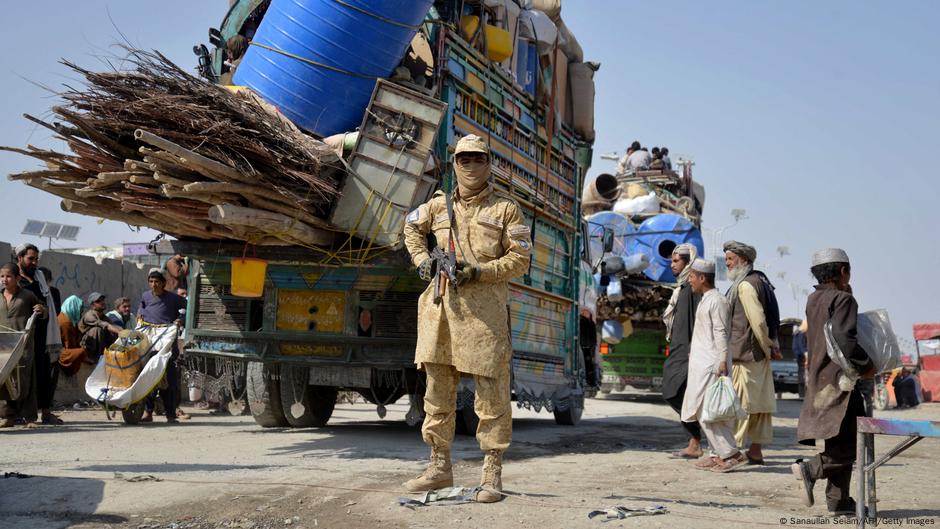In the wake of deadly clashes between the Taliban in Afghanistan and Pakistan last month, Pakistani authorities have stepped up their efforts to bring back Afghan migrants, including increasing police raids on Afghan-run shops and rented homes.
The surge has been felt extending beyond the border areas, to the capital Islamabad and nearby Rawalpindi. Fearing legal implications, landlords have evicted Afghan tenants or refused to renew leases, forcing families to find new homes.
Afghans living in Pakistan also face serious obstacles if they attempt to renew their visas, a process that is expensive, uncertain and often subject to significant delays.
“We are in hiding and our families are divided, unable to stay in one place for fear of arrest and police violence. Our businesses have come to a halt, our children have dropped out of school and we don’t have time to consider our next step,” an Afghan national told DW, speaking on condition of anonymity.
‘This place is my home’
Over the past two weeks, several Afghans well settled in Pakistan reported police searching homes in various parts of Islamabad and Rawalpindi.
In addition to the raids and never-ending bureaucratic hurdles for those wishing to stay in Pakistan legally, Pakistani police have now begun making announcements in mosques warning that anyone who helps Afghan migrants, including giving them homes or stores, will be considered a criminal by the government.
Many urban Afghans are surprised by this change in policy, as they have been living and working in Pakistan for decades.
Abdullah Khan, a 32-year-old engineer, told DW, “I was born in Pakistan and completed my education here; this place is my home. We have built our lives and careers in this country, and I never thought that the place that has given me everything would one day force me to move out. It is really heartbreaking and we are shocked that this could happen to us.”
Islamabad views Afghans as security risk amid conflict
However, the Pakistani government insists that illegal Afghan migrants pose a security risk.
“For decades, we have welcomed Afghans to our country, but now it is important for those living here illegally to depart with dignity and respect,” Talal Chaudhry, a senior interior ministry official, told DW. Chaudhry said that “some Afghans are linked to extremism and drug-related crimes, and many are supporting these criminal activities.”
On the other hand, Afghan activist Aziz Gul says that migrants are being used to gain leverage in the conflict between Islamabad and the Taliban.
“Afghans in Pakistan are peaceful people and they have no home,” he told DW. “Why would they pose a security risk to their host country?”
“Afghans should not be used as pawns in the political tension between the two governments,” he said.
Don’t have anywhere to go except the park?
Zahra Mosavi, an Afghan activist living in hiding in Pakistan and detained by Pakistani police, told DW that Pakistani landlords “may now face tax fees and financial penalties” if they rent homes or businesses to Afghans.
Mosavi said, “After this decision, landlords have started mistreating Afghan residents even though they had signed a one-year lease, while without collecting security payments, they keep threatening Afghans every day to leave the premises. Some landlords have cut off electricity and gas supply to Afghan homes.”
Mosawi also warned that with some families seeking shelter in parks, their situation was becoming more dire as temperatures dropped.
Sardar Akhtar, the landlord of an upscale housing society in Rawalpindi, said he was not aware that the government had any strict policy against giving accommodation to Afghans. Additionally, they had to inform the police that their tenants had moved out and that they had canceled their rental agreements.
“The police raided my house and I assured them that we would not rent it out again. However, they are constantly monitoring our property,” he told DW.
It took decades to accept Afghan refugees
Pakistan has hosted large numbers of refugees from neighboring Afghanistan for several decades, including those fleeing the Soviet invasion that lasted nearly ten years, beginning in late 1979.
More Afghan migrants fled the civil war in the 1990s, the US-led invasion in 2001, the years of fighting that followed, and the fall of Kabul to the Taliban in 2021.
However, in recent years, Pakistan has been determined to reduce the number of Afghans living on Pakistani soil.
More than 1.5 million Afghans either voluntarily or forcibly left Pakistan between the start of the campaign in 2023 and mid-October 2025, according to the UN refugee agency UNHCR.
UNHCR also estimates that approximately three million Afghan nationals still live in the country, of whom approximately 1.4 million have proper documentation.
“UNHCR appreciates Pakistan’s generosity in hosting refugees for more than 45 years amid its own challenges. Pakistan has a proud history of hospitality, and it is important to continue that tradition at this critical time, but we are concerned by the dire conditions faced by Afghans in Pakistan,” Qaiser Khan Afridi, a spokesperson for the UNHCR in Pakistan, told DW.
Edited by: Darko Janjevic






Leave a Reply